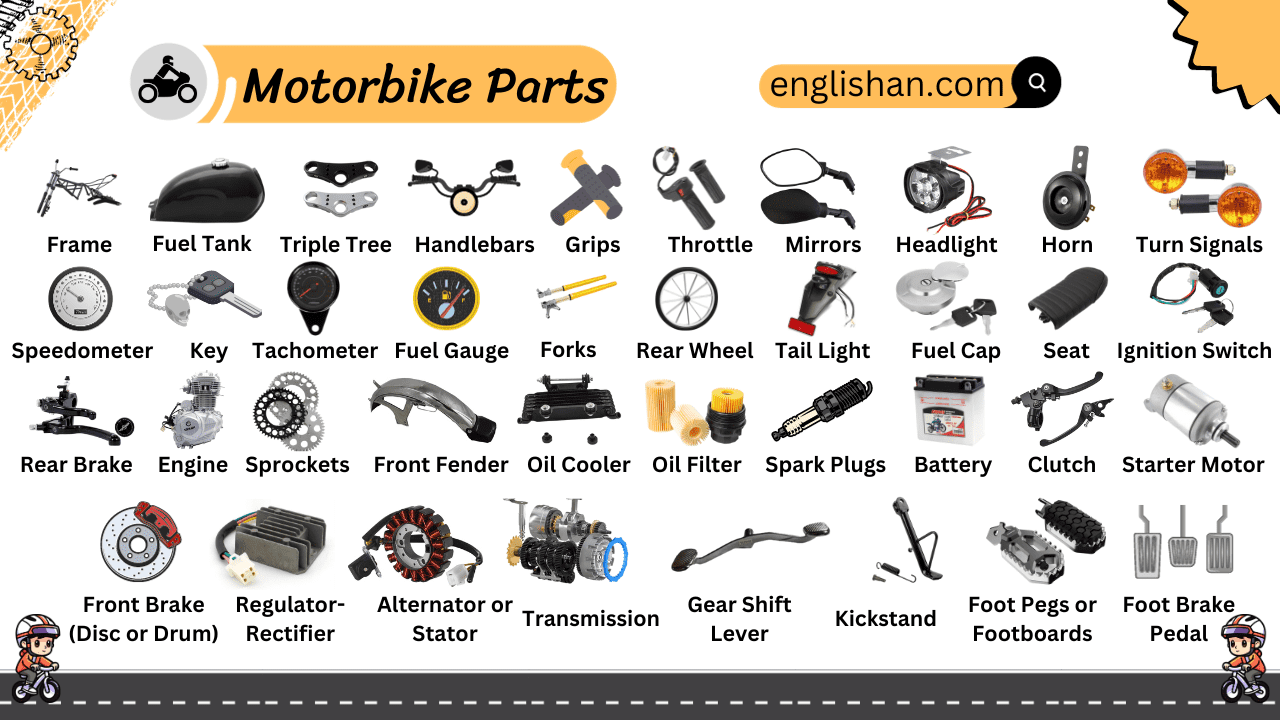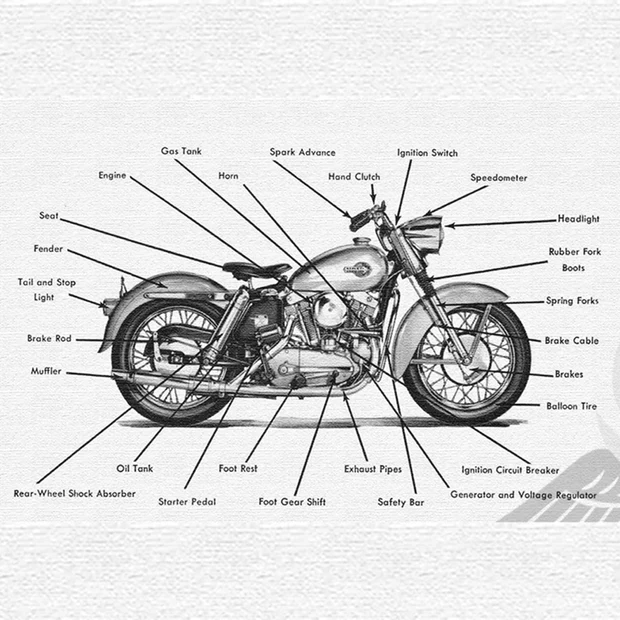Tips for Buying Trusted Bike Parts Wellington Online Without Regret
Tips for Buying Trusted Bike Parts Wellington Online Without Regret
Blog Article
Discover the Necessary MotorBike Components You Need for Optimal Performance
Recognizing the important parts of a bike is basic for attaining peak efficiency. Each component, from the engine to the braking system, plays a critical role in general capability and safety and security. Routine upkeep can protect against unforeseen failures and enhance the riding experience. Nevertheless, many cyclists overlook the complexities of these systems. Uncovering just how they collaborate can result in an extra reliable trip. What vital parts should every biker focus on?
The Engine: The Heart of Your Motorbike
The engine acts as the core part of a motorbike, driving its efficiency and defining its abilities. It is liable for transforming gas into mechanical energy, which powers the bike ahead. Various kinds of engines are used, consisting of single-cylinder, V-twin, and inline arrangements, each offering unique attributes matched for various riding purposes and designs. The engine dimension, normally determined in cubic centimeters (cc), significantly affects performance, with larger engines normally giving more power and torque.Furthermore, the engine's style and modern technology, such as gas injection systems or air-cooling versus liquid-cooling, impact efficiency and dependability. Maintenance is vital for peak operation; variables like regular oil changes and monitoring ignition system guarantee long life. Riders frequently consider an engine's responsiveness and level of smoothness, as these qualities enhance the overall riding experience. Inevitably, the engine continues to be an important component that specifies not just the motorcycle's performance however likewise the rider's link to the equipment.
The Transmission: Changing Gears Smoothly
The transmission plays an important duty in a motorcycle's efficiency, particularly in the technicians of equipment moving. Recognizing how to move equipments smoothly can enhance the general riding experience, while normal maintenance warranties peak capability. Correct interest to these facets can considerably impact the durability and effectiveness of the motorcycle.

Equipment Shifting Mechanics
Smooth gear moving is necessary for excellent motorbike efficiency, considerably impacting both acceleration and control. The auto mechanics of gear changing entail the communication between the clutch, equipment bar, and transmission system. When a biker engages the clutch, it disengages the engine from the transmission, enabling an equipment change without harming the parts. A well-timed release of the clutch, integrated with specific activity of the gear bar, helps with a smooth modification in between equipments. This procedure guarantees that the engine runs within its ideal power band, improving performance. Bike Parts Wellington. Additionally, recognizing the equipment proportions and their result on speed and torque can help cyclists make notified choices during changes, ultimately contributing to an extra responsive and delightful riding experience
Maintenance Tips Relevance
Regular maintenance plays a vital duty in guaranteeing that the transmission system runs effectively, permitting smooth gear changes. Frequently altering the transmission and checking liquid is crucial, as old fluid can bring about raised rubbing and wear. Furthermore, evaluating the clutch for wear guarantees peak interaction and disengagement, avoiding slippage throughout gear adjustments. Lubrication of relocating components is equally important to lower rubbing and enhance efficiency. Motorcycle owners should likewise monitor for leakages and uncommon noises, as these can suggest underlying concerns. By sticking to these upkeep suggestions, motorcyclists can lengthen the life expectancy of their transmission system, assuring that equipment shifts remain smooth and adding to the overall performance of their motorcycle.
The Braking System: Ensuring Security on Every Experience
Braking systems are fundamental elements that directly affect a motorbike's safety and security and performance. They contain numerous parts, consisting of brake pads, blades, calipers, and hydraulic lines, all functioning with each other to guarantee effective slowdown. The kind of braking system-- generally either disc or drum-- influences responsiveness and quiting power.Regular maintenance is necessary to promote peak performance; used brake pads can cause reduced effectiveness and enhanced quiting distances. In addition, the quality of brake liquid need to be kept an eye on, as it can soak up wetness gradually, endangering braking efficiency.Riders should also consider the significance of anti-lock stopping systems (ABDOMINAL MUSCLE), which stop wheel lockup throughout sudden stops, improving general safety. Properly operating brakes are not just regarding stopping; they impart confidence in the motorcyclist, enabling more secure navigating through different terrains. Eventually, a reliable stopping system is vital for taking pleasure in every adventure with satisfaction.
The Suspension: Enhancing Comfort and Control
A well-functioning shock absorber significantly adds to a motorbike's overall efficiency, matching the efficiency of the stopping system. The suspension plays a considerable duty in taking in shocks from uneven surface areas, assuring a smoother experience while keeping tire contact with the road. This call is vital for both security and control, allowing bikers to browse edges with self-confidence and precision.Different sorts of suspension systems, such as telescopic forks or mono-shocks, provide varying degrees of comfort and handling. Correctly tuned suspension enhances responsiveness, supplying the biker with an extra connected feel to the motorbike. Normal upkeep checks are crucial to ascertain the suspension components, consisting of dampers and springtimes, are operating at their finest. An efficient suspension system not just elevates the riding experience yet also adds to the longevity of other motorbike components by reducing deterioration. Consequently, purchasing high quality suspension is vital for any serious motorcycle enthusiast.
The Tires: Attaching You to the Road
Tires play a necessary duty in a motorbike's efficiency, acting as the main web link in between the cyclist and the road. Understanding the various kinds of tires offered can significantly affect handling and safety. Additionally, normal maintenance is crucial to guarantee peak tire performance and durability.
Tire Keys In Explained
Exactly how do various tire types influence a motorbike's efficiency? Tire kinds play an essential role in establishing a motorbike's handling, grip, and stability. Sport tires, developed for high performance, offer enhanced grip and responsiveness on paved roads, making them perfect for competing and aggressive riding. Conversely, touring tires prioritize durability and comfort, providing a smoother ride for long-distance traveling. Off-road tires, defined by their tough walk patterns, master traction on unpaved surfaces, appropriate for adventure enthusiasts. In addition, dual-sport tires blend characteristics from both on-road and off-road categories, dealing with flexible riding demands. Inevitably, choosing the best tire kind is important for optimizing performance, making sure safety and security, and improving the general riding experience.
Upkeep Tips Offered
While riding when driving, maintaining suitable tire condition is important for security and performance. On a regular basis examining tire pressure is essential, as under-inflated tires can result in bad handling and enhanced wear. It is suggested to examine step depth often; used tires concession hold and stability. Additionally, cyclists should try to find signs of Motorbike Components NZ damage, such as bulges or cracks, which can indicate the demand for substitute. Rotating tires occasionally guarantees also wear, improving long life. Moreover, keeping tires clean from particles and staying clear of extreme visuals can lengthen their life-span. Keeping correct alignment and equilibrium contributes to peak performance, lessening stress on other bike parts. Sticking to these maintenance pointers will substantially enhance the overall riding experience.
The Fuel System: Sustaining Performance and Efficiency
The fuel system plays an important function in making the most of a motorcycle's efficiency and effectiveness, as it ensures the ideal delivery of gas to the engine. It makes up numerous essential parts, consisting of the gas tank, fuel pump, gas filter, and fuel injectors or carburetor. Each part has to function efficiently to ensure a smooth and effective ride.The gas storage tank stores gasoline and supplies it to the engine via the fuel pump, which generates the essential stress. A fuel filter avoids pollutants from going into the engine, while the injectors or carburetor mix fuel with air for combustion.Proper upkeep of the fuel system is essential; a clogged filter or malfunctioning injector can result in decreased efficiency and raised fuel intake. By validating that the gas system operates efficiently, motorcyclists can take pleasure in better throttle response, far better gas economic climate, and on the whole boosted riding experience.
The Electric System: Powering Your Experience
An efficient electrical system is necessary for the total performance and security of a motorbike, as it powers critical parts such as the ignition, illumination, and various electronic systems. This system consists of the battery, which stores power, and the alternator, liable for creating power while the engine runs. The electrical wiring harness attaches these components, making certain reputable power distribution.Additionally, integrates secure the system from overloads, while relays aid manage high-current devices with low-power signals. A well-kept electrical system improves efficiency by making sure smooth beginnings and consistent operation of lights and signals, important for motorcyclist presence and safety.Regular checks of the battery's cost and links are crucial for stopping electrical failings. Riders need to likewise check wiring for deterioration, making sure all parts work preferably. Eventually, a durable electric system contributes substantially to the go to this website overall performance and integrity of the motorcycle.
Often Asked Inquiries
Just how Commonly Should I Change My Bike's Battery?
The frequency of motorbike battery replacement depends on use and upkeep (Motorcycle Parts Auckland). Generally, batteries should be changed every three to 5 years. Routine checks can help recognize when a substitute is essential for peak performance
What Tools Do I Need for Standard Motorbike Maintenance?
For standard motorcycle maintenance, one requires essential tools such as a socket set, wrenches, screwdrivers, pliers, tire stress gauge, and a torque wrench. These tools promote reliable upkeep and guarantee the bike runs effectively and safely.
Just How Can I Enhance My Motorcycle's The rules of aerodynamics?
To improve motorcycle the rules of aerodynamics, one must take into consideration changing fairings, making use of windshield extensions, optimizing body setting, and minimizing general weight. These alterations assist reduce drag, boosting stability and gas performance during experiences.
What Are the Indications of a Failing Electric System?
Indicators of a failing electrical system include dimming lights, trouble starting, uneven instrument analyses, and blown integrates. Motorbike Components NZ. Uncommon scents or rust around battery terminals might also indicate underlying issues requiring instant attention for safety and security and efficiency

How Do I Choose the Right Oil for My Motorcycle?
When selecting oil for a motorcycle, one ought to take into consideration the supplier's specifications, thickness rankings, and the kind of riding. Furthermore, conventional versus artificial oil can influence efficiency and engine protection, affecting the choice considerably. The engine size, generally gauged in cubic centimeters (cc), significantly affects performance, with bigger engines generally offering more power and torque.Furthermore, the engine's layout and modern technology, such as fuel injection systems or air-cooling versus liquid-cooling, affect effectiveness and reliability. A well-functioning suspension system substantially contributes to a motorcycle's overall efficiency, complementing the effectiveness of the stopping system. The gas system plays an essential role in making best use of a motorcycle's performance and efficiency, as it guarantees the ideal shipment of gas to the engine. A gas filter protects against contaminants from going into the engine, while the injectors or carburetor mix gas with air for discover here combustion.Proper maintenance of the gas system is crucial; a stopped up filter or malfunctioning injector can lead to decreased efficiency and enhanced fuel consumption. A properly maintained electric system boosts performance by making certain smooth begins and constant operation of lights and signals, important for motorcyclist presence and safety.Regular checks of the battery's fee and connections are vital for avoiding electrical failings.
Report this page